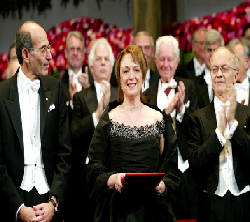March 2019 Research, Science and Knowledge
Read the articles selected in March 2019
The role of universities in regional innovation ecosystems
By Sybille Reichert
Source: https://eua.eu/
In the postindustrial society, the production of knowledge relies on networks that leverage the regional proximity to make converge the multiple perspectives of the different actors of innovation, which is the end of a no linear, but reiterative and cooperative process which implies the pivotal role of the university.
Read more:
https://eua.eu/downloads/publications/eua%20innovation%20ecosystem%20report_final_digital.pdf
SIGI 2019 Global Report
Source: http://www.oecd.org/
The gender parity contributes to the economic growth in objective terms, and is the result of policies that are translated in laws against the sexual discrimination, although the social and family norms are even more pervasive than the law and condition all the cycle of life of the woman in many cultures.
Read more:
https://read.oecd-ilibrary.org/development/sigi-2019-global-report_bc56d212-en#page1
Low pay, exclusivity requirements and lack of support plague postodocs across Europe
By Chris Woolston
Source: Nature, 22 February
A study reveals wide regional disparities in postdoc’s conditions. In Southern and Eastern Europe are reported a lack of institutional support and a career-development plan, low salaries and contractual limitations for postdoctoral researchers.
Read more:
https://www.nature.com/articles/d41586-019-00688-8
How to equip graduates for the future
By Anna Mckie
Source: Times Higher Education, 7 March

In a work world ever more fluid , the future employees are required a flexible range of transferable problem-solving skills, but academic teaching is not ready to the cognitive transformations of the fourth industrial revolution.
Read more:
https://www.timeshighereducation.com/features/how-equip-graduates-future
54 networks bid to join European universities pilot
By Jan Petter Myclebust
Source: World University News, 7 March
The funding of the project wanted by the President Macron to create networks of European universities where to graduate, and endorsed by the European Commission has been doubled after the enthusiastic presentation of dozen of bids.
Read more:
https://www.universityworldnews.com/post.php?story=20190307070330629
Report on the implementation of Council Conclusions of 1 December 2015 on Advancing Gender Equality in the European Research Area
Source: ERA Portal
This report presents what the European countries have made by implementing the ERA Roadmap, at institutional level, in decision making, in gender knowledge and monitoring to implement the ambitious goals set up by the Competitiveness Council on Gender Equality.
Read more:
file:///C:/Users/Roberta%20Capo/Downloads/Report_Implementation_CC_of_1_Dec_2015.pdf
Gender equality in R&I: 20 Years of EU activities and still a long way to go
Source: https://eua.eu
The picture of gender equality today is far more complex than twenty years ago. Despite the important advancements in the European average the more and more sophisticated analyses developed in the research sector with the endorsement of the EC show a gap between lower and higher innovators.
Read more:
Maximising opportunities, minimising risks-meeting the digital challenge for girls and boys
Source: EIGE
This research shows how digitalisation is affecting both young and adult population, offering opportunities to increase gender equality but also bringing risks sexually connotated. Although social media have a transformative power, they can also replicate gender bias and norms.
Equal Pay International Coalition
Source: oecd.org
Equal Pay International is an ILO organism, which joins the forces of the UN Women, and the OECD, to orient towards gender parity the simple but not easy 2030 Agenda goal of equal pay for work of equal value.
Read more:
https://www.equalpayinternationalcoalition.org/
Women who win prizes get less money and prestige
By Yfang Ma, Diego Oliveira, Theresa Woodruff & Brian Uzzi
Source: Nature, 16 January

Women are under-represented in awards for research, but are more awarded for reasons of social and public committment. The awards they receive give less money, fewer chances to promote a career and have less influence on the media.
Read more:
https://www.nature.com/articles/d41586-019-00091-3
What matters in research and innovation?
Source: the European Commission
The contribution of the different countries to R&I doesn’t depend only on the demographic or economic size, but also on the public priorities, and so it is also for the distribution of European R&I funds, and the consequent share of responsibility. A stronger R&I needs a development convergence between the European regions.
Read more:
https://ec.europa.eu/info/sites/info/files/research_and_innovation/rise/ki0718019enn.pdf
Doctoral education in Europe today: approaches and institutional structures
Source : https://eua.eu
This report presents the state-of-art of doctoral education in Europe after decades of reforms like the Salzburg Process, to enable universities to take part not only in their research but also in the institutional management of doctoral education to a broader European context.
Read more:
https://eua.eu/downloads/publications/online%20eua%20cde%20survey%2016.01.2019.pdf
Scholars divulge their biggest mistakes
By Robert Zaretsky
Source: Times Higher Education, 31 January
The fortune is sprinkled with failures. Our missteps should be included in our CVs, because they point out not only on our weaknesses, but also on the weaknesses of the system where we operate. Six academics tell their biggest mistakes.
Read more:
https://www.timeshighereducation.com/features/scholars-divulge-their-biggest-mistakes
What the fourth industrial revolution could mean for education and jobs
By Andreas Schleicher,
Source: oecd.org, 22 January
Education has to take from digitalization all the tools and strenghts, to be a source of democracy rather than of inequalities. Education must change with technology, but we have to run the race with artificial intelligence through our emotional skills and human values.
Read more:
Has marketisation of higher education reached its limits?
By Juliette Torabian
Source: University World News, 22 February
League tables and rankings even though offering an image of objectivity, transparency and accountability, are the expression of a market-based ideology that has influenced policies in higher education but didn’t transform universities.
Read more:
https://www.universityworldnews.com/post.php?story=20190218123554751
Info
- Pubblicato il : 01/04/2019 Modificato il : 04/04/2019

